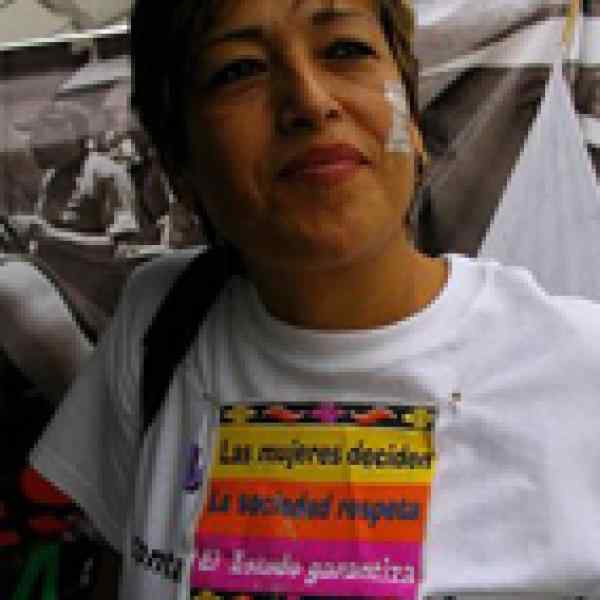Introduction
Adela Muñiz helps civic groups and legislators find common ground in a range of women's issues, boosting citizens' access to the power of government.
The New Idea
When Adela began to monitor legislation pertaining to women's issues, she recognized certain trends. First, citizen movements had no faith in lobbying the nation's legislature. After years of authoritarian rule, the government was unresponsive and beholden to powerful political and economic interests. Then, in 1997, a series of reforms created parliamentary sub-commissions for specific issue areas. Ironically, the legislators on those commissions felt out of touch with the social movements most relevant to their area. Adela saw the situation as a major opportunity to create a bridge between the government and the public. Consequently, she launched the Consortium for Parliamentary Dialogue and Gender Exchange to help shape legislation on women's issues, and educate advocacy groups about how to advance their agendas.
The Problem
Citizen participation and representation have been nearly non-existent in Mexican politics. Years of one-party hegemony stifled civic initiative and created a general culture of apathy. Meanwhile, certain citizen groups became confrontational in the absence of channels for dialogue on legislative matters. While significant political reforms have been achieved in recent years, citizen groups have failed to exploit the openings, and legislators are unsure of how to work directly with them.
Meanwhile, discrimination against women in Mexican society is reflected in the letter and implementation of existing laws. For example, abortion is forbidden throughout the country. While women who are raped can have an abortion, written and practical procedures for a legal abortion, in this case, are absent. Similarly, criminals who imprison women as sexual servants receive lighter sentences than those who kidnap people for ransom. Although the law states that pregnancy is not grounds for dismissal from a job; and an employer cannot ask a woman to take a pregnancy test when seeking employment-this has not been implemented. Female Mexican representatives have had little success in pushing initiatives for reform. Of thirty-six gender initiatives presented in the Chamber of Deputies between 1990 and 1999, three have been approved; the rest languish in committees.
The Strategy
During a stint as a researcher at the Chamber of Deputies, Adela became aware of the barriers to drafting new laws. She began to speak with women's groups about the need to create an entity to promote dialogue, follow-up processes, and budgets in order to pass laws to improve the status of women. Adela took action, organizing staff from four women's organizations to become the Consortium. Sub-groups work on reproductive and sexual rights, labor rights, gender-based violence reform, anti-discrimination law, and respect for sexual preference and human rights. They also provide grassroots training workshops on civic and legal issues, networking, and promoting strategic partnerships.
To develop allies in the government, Adela met with legislators on the parliamentary commission on gender equity. She encouraged their efforts to change the commission's official status from consultative to proactive in order to propose legislation directly. She also made proposals for accountability measures to govern Executive interventions, a significant act since the Presidency has traditionally acted independently from the Legislative bodies in Mexico.
Adela's goal is to push for at least three new legislative projects addressing women's rights issues, while pressuring the legislature to allocate funds to benefit Mexican women. She will continue publishing and disseminating monthly information about on-going legislative debates, enlisting media assistance. Adela also plans to organize national and local forums, with the participation of federal, state, and municipal legislators and representatives of women's groups. At the same time, she will broaden the legal status of the Consortium to work on behalf of other social groups, such as indigenous people, seniors, and the disabled. To this end, she has already won grants for the Consortium from the National Endowment for Democracy.
The Person
Adela was born to a family of peasant storekeepers, and was taught that women had to be submissive. Early on, she rebelled. She organized football tournaments for girls in her high school, and became a vociferous leader for equal rights. Adela eventually broke with her family because of their controlling attitude. When her marriage ended and she had to care for two small boys alone, she worked in business for several years, distinguishing herself for her competence and reliability. One job involved union work, and she quickly rose to a position with access to national policy discussion. She was dissatisfied, however, because she wanted to be more directly involved in women's issues. In 1997, Adela coordinated the Second Institute for Women Leaders at the Autonomous Metropolitan University-Xochimilco, funded by the Friedrich Ebert Foundation. She researched the 1997 parliamentary reforms, looking for new opportunities therein, and realized it was the perfect political time to found the Consortium.
